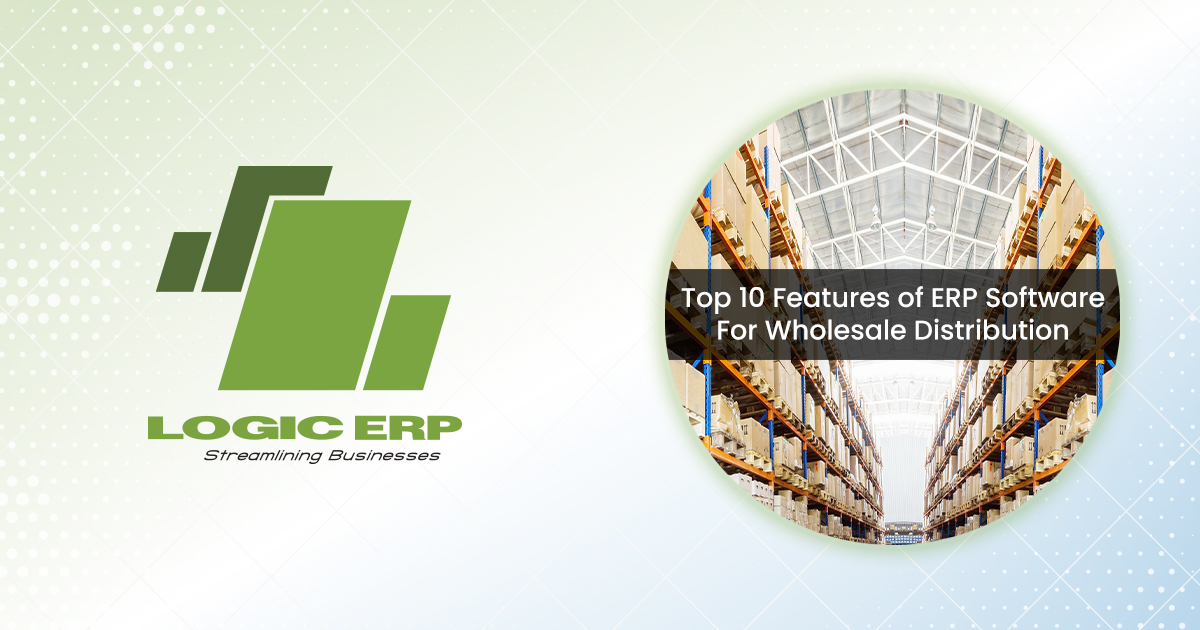

Companies must remain agile and efficient in their operations in today’s fast-paced and ever-changing commercial world. In particular, businesses in the wholesale and distribution sectors confront issues such as managing complicated supply chains, optimizing inventory levels, and satisfying client requests promptly and cost-effectively.
ERP systems are meant to assist organizations in managing their complete operations, from procurement to distribution, all inside a single integrated platform. With the support of an ERP system, businesses can automate procedures, obtain real-time visibility into their operations, and make data-driven choices that may enhance productivity and stimulate development.
The wholesale distribution business is crucial to a complicated producer, merchant, and customer network. The seamless movement of data and commodities is critical in such a dynamic environment, requiring robust ERP systems for production and distribution. The purpose of this essay is to throw light on the essential aspects of ERP software created exclusively for the wholesale distribution business.
ERP (Enterprise Resource Planning) software has evolved as a potent tool for integrating several company operations into a unified system. It boosts efficiency, lowers costs, and improves decision-making capacities in the wholesale distribution industry. Let’s look at some critical aspects of ERP software that make it a game changer in this market.
- Inventory Management: Efficient inventory management is a crucial element of ERP software for the distribution business. It enables firms to keep ideal stock levels while lowering the risk of overstocking or stock-outs. The platform also allows for real-time inventory tracking across several locations, which aids in timely purchase and restocking.
- Supply Chain Management: An ERP supply chain module may help you streamline all aspects of your supply chain operations, such as procurement, order fulfillment, logistics, and customer care. This module promotes supply chain transparency, allowing organizations to discover bottlenecks, strengthen supplier relationships, and increase customer happiness.
- Sales and Customer Management: ERP software should provide comprehensive sales and customer management functionality. It should efficiently handle order processing, pricing, quotes, sales forecasting, and customer relationship management. A complete perspective of client interactions and sales data enables firms to make data-driven choices, increasing profitability.
- Financial Management: Financial management software aggregates all financial transactions to provide a uniform view of the company’s financial health. Accounts payable and receivable, budgeting, financial reporting, and regulatory compliance are all made more manageable.
- Business Intelligence (BI) and Analytics: Having Business Intelligence and Analytics features in your ERP software is critical in today’s data-driven environment. This function converts raw data into actionable insights, allowing decision-makers to make well-informed strategic decisions. Dashboards and reports in real-time give a glimpse of business performance across several criteria.
- Capabilities for Integration: A robust distribution ERP software should be able to integrate with other company programs such as CRM, eCommerce platforms, or third-party logistics. Smooth data flow between systems is ensured via seamless integration, which reduces human data entry and mistakes.
- Mobility: As the company landscape gets more mobile, so should your ERP system. Mobile ERP software access enables users to access corporate data at any time, from any location, and on any device. This function boosts productivity and ensures that corporate operations run smoothly.
- Customization: The ERP system should be adaptable to the unique demands of each wholesale and distribution company. Custom processes, reporting, and user interfaces are examples of this. Overall, developing an effective ERP system for the wholesale and distribution industry necessitates a thorough understanding of the industry’s specific needs and challenges. Additionally, there should be a focus on flexibility, scalability, digitization, mobile capabilities, security, real-time data and analytics, integration with other systems, and customization.
- Flexibility: The ERP system should be adaptive and versatile to satisfy the unique demands of each wholesale and distribution organization. Other systems and technologies, such as e-commerce platforms, warehouse management systems, and transportation management systems, should be able to integrate with them.
- Scalability: An enterprise resource planning (ERP) system should be scalable to support the business’s development and expansion. As the company expands, it should be able to manage more data and transactions.
Conclusion
The characteristics of ERP software specialized for the wholesale distribution industry play an important role in improving operational efficiency, customer happiness, and profitability. Businesses may handle the difficulties of the distribution sector more efficiently by deploying an ERP system with these must-have features. Remember that selecting an ERP solution is more than just checking off a feature list. Choosing a solution that works with your existing company operations and can expand with it is essential. So, weigh your alternatives carefully and make an informed decision.

